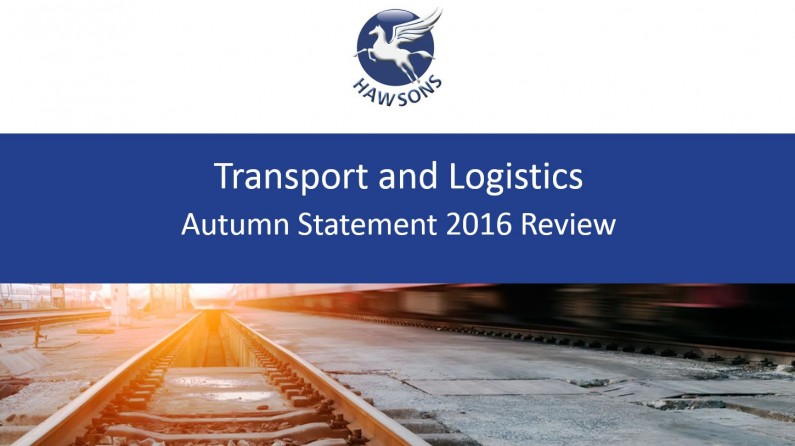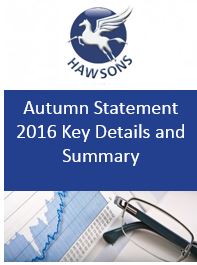Transport and Logistics Autumn Statement 2016 review
Philip Hammond presented his 2016 Autumn Statement on Wednesday 23rd November. His speech set out both tax and economic measures. In this article we look at some of the measures that may affect the Transport and Logistics sector.
In Summary (general):
- the government reaffirming the objectives to raise the personal allowance to £12,500 and the higher rate threshold to £50,000 by the end of this Parliament
- reduction of the Money Purchase Annual Allowance
- review of ways to build on research and development tax relief
- tax and National Insurance advantages of salary sacrifice schemes to be removed
- anti-avoidance measures for the VAT Flat Rate Scheme
- autumn Budgets commencing in autumn 2017.
In addition the Chancellor announced the following pay and welfare measures:
- National Living Wage to rise from £7.20 an hour to £7.50 from April 2017
- Universal Credit taper rate to be cut from 65% to 63% from April 2017.
In the March Budget the government announced various proposals, many of which have been subject to consultation with interested parties. Some of these proposals are summarised here. Draft legislation relating to many of these areas will be published on 5 December and some of the details may change as a result.
- Growth to slow and inflation to rise in next two years
- Fuel duty frozen at 57.95p per litre of fuel sold
- £390m to be invested in low-emission vehicles
- Money invested in low emission vehicles will free up money for more EV chargers
- 100% of first-year capital allowance on the installation of EV charging
- £1.1bn to be invested in local transport networks in England
- Further £220m to address local traffic pinch points
- £390m to be invested in development of transport technology of the future
- £23bn National Productivity Investment Fund to be spent between 2017/18 and 2021/22
- £3bn of that Fund being earmarked for transport related projects
- National Living Wage set to increase from £7.20 to £7.50 per hour from April 2017
- Corporation Tax to fall to 17% from April 2020
Autumn Statement Transport and Logistics Impact
Growth to slow and inflation to rise
Paul Wormald, Partner at Hawsons, commented: “The outlook for growth to slow and inflation to rise in the next two years is not great news for a sector that prospers when demand for goods is high and where profit margins can already be tight, although the announcement to freeze fuel duty provided a little comfort for road transport businesses. The general increase in the level of the National Living Wage of 30p per hour is likely to impact payroll costs for many businesses along with a hike in Insurance Premium Tax.”
“The announcement of a £23bn National Productivity Investment Fund to be spent between 2017/18 and 2021/22 will also affect the sector with £3bn being earmarked for transport related projects. Whether the headlines of 80% of the strategic road network being resurfaced and promises of the largest investment in the railway since Victorian times will be delivered remains to be seen.”
“A sum of £390m has been pledged to develop the transport technology of the future centering around a changing infrastructure for electric vehicles, support for low emission taxis and buses, and the development of alternative fuels for HGVs and aircraft. On the taxation front, the government has committed to cutting the rate of Corporation Tax to 17% by 2020 and for those businesses looking at investing in electric vehicles, there is a new 100% first year allowance on the cost of installing electric charge points.”
“Overall, a mixed picture for the sector. The pledges of investment in the transport infrastructure is welcomed, but more importantly they must be delivered. Inevitably, there will be some upward pressure on costs for businesses in this sector which, coupled with a potential slowing of demand in the wider economy, will provide challenges for the sector.”
For more information
More from our transport and logistics experts
You can find all of our latest transport and logistics sector news and newsletters here.
If you are looking for advice in a particular area, please get in touch with your usual Hawsons contact.
Alternatively, we offer all new clients a free initial meeting to have a discussion about their own personal circumstances – find out more or book your free initial meeting here. We have offices in Sheffield, Doncaster and Northampton.
Paul Wormald is a partner at Hawsons, working in the Doncaster office. He worked previously with two national firms of Chartered Accountants prior to joining Hawsons in 2001. For more information or advice on anything covered in this article, please contact Paul on pw@hawsons.co.uk or 01302 367 262.[/author_info]


